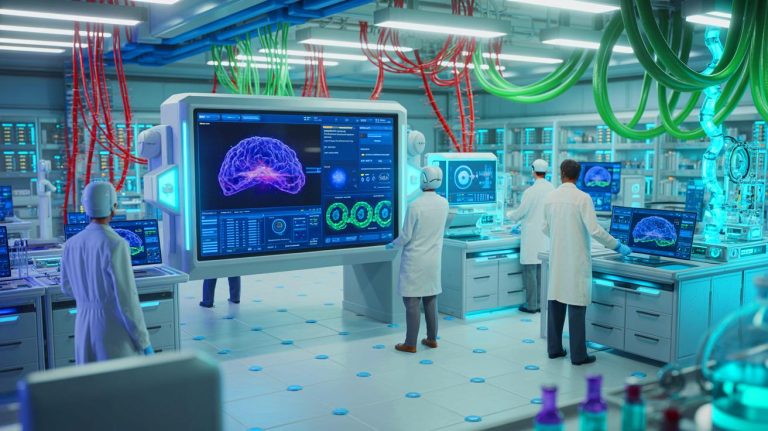| IN A NUTSHELL |
|
In an era where technological advancement is accelerating at an unprecedented pace, OpenAI is taking bold steps to address potential risks associated with artificial intelligence in the realm of biology. The integration of AI into biological research and development marks a significant milestone, raising concerns among researchers and security engineers. OpenAI is not only sounding the alarm on these risks but also implementing a series of measures to prevent any unintended consequences that could arise from the misuse of its tools. With international alliances and strategic frameworks, OpenAI is spearheading efforts to ensure that innovation does not come at the expense of global safety.
The Critical Threshold in Biological AI
Artificial intelligence has transcended beyond mere algorithmic computations or text generation to infiltrate biological laboratories, interacting with some of the most sensitive aspects of the living world. OpenAI, the force behind ChatGPT, foresees an imminent shift towards high-level capabilities in the biological domain. These advanced AI models can interpret laboratory experiments, guide molecular synthesis, and optimize complex chemical reactions with remarkable accuracy. This evolution is not without its concerns.
In a pivotal announcement on June 18, 2025, OpenAI acknowledged a breakthrough necessitating utmost vigilance. The potential exists for untrained individuals to use these tools to accelerate the fabrication of pathogenic agents. The diminishing technical barriers to accessing laboratory equipment and DNA sequencers amplify these risks. OpenAI’s proactive stance highlights the urgency to monitor and regulate AI’s capabilities to prevent misuse in biological contexts.
Beyond Theoretical Risks: AI’s Biological Threats
OpenAI’s concern lies with what it terms the “elevation of novices,” where ordinary users might replicate complex biological knowledge without understanding the implications. Johannes Heidecke, OpenAI’s security systems lead, warns that future AI models, like o3’s successors, could potentially aid in designing biological weapons. This prospect underscores the necessity of stringent controls to prevent AI tools from becoming public health threats.
To mitigate these risks, OpenAI has integrated multiple safeguards into its latest models, including the o4-mini. Any request deemed sensitive triggers an immediate suspension, followed by dual filtering—both algorithmic and human. This multilayered control is not just a technical precaution but an ethical imperative. The approach aligns with the stance of other tech companies like Anthropic, which also emphasize adjusting systems to combat the risks associated with biological and nuclear weapons.
OpenAI’s Push for a Global Framework
OpenAI recognizes that no single entity can manage the dangers posed by AI in biological domains alone. Accordingly, it plans to convene an international summit on biodéfense in July, aiming to gather public researchers, specialized NGOs, and government experts. The goal is to evaluate and implement the most effective preventive strategies.
The company collaborates with a network of partner institutions, such as the Los Alamos National Laboratory and bio-surveillance agencies in the U.S. and UK. It also develops permanent detection systems and employs ethical hacking teams to identify security vulnerabilities. OpenAI’s strategy is rooted in a stringent rule: no model with significant biological capability will be released publicly until vetted by two independent supervisory bodies. This principle is part of the Preparedness Framework, a risk assessment model created with biology and cybersecurity experts. OpenAI hopes these measures will foster a global innovation ecosystem where safety is paramount.
Charting the Future of AI and Biological Safety
As AI continues to evolve, its potential to impact biological sciences is both exciting and daunting. OpenAI’s proactive approach in addressing these challenges sets a precedent for responsible innovation. By establishing international collaborations and stringent frameworks, OpenAI aims to navigate the complexities of AI in biology without compromising global safety. However, the question remains: How will the rest of the world respond to ensure that AI’s integration into biology is both secure and beneficial?
Did you like it? 4.6/5 (30)








Wow, this is both fascinating and terrifying! 😱 How do we balance innovation and safety?
What measures is OpenAI taking to prevent misuse by “untrained individuals”?
AI creating biological weapons sounds like a sci-fi movie! Are we sure this isn’t a plot twist? 🤔
Glad to see OpenAI taking responsibility. Thank you for the transparency! 🙏
Is this AI technology already in use, or just theoretical at this point?
Sounds like OpenAI is doing a great job at addressing these concerns. Keep it up! 👍
Could this kind of AI be used for good, like curing diseases, instead of creating weapons?
What happens if these AI tools fall into the wrong hands? Scary thought. 😬
How does OpenAI plan to collaborate with international bodies on this issue?
I’m all for innovation, but this is a bit too much. Where do we draw the line?
Is it possible to completely safeguard these technologies? Seems like a huge challenge.
Hats off to OpenAI for addressing these issues head-on. 👏
How can the public be reassured that these AI models won’t be misused?
Why is this AI being developed if it’s so dangerous? Doesn’t make sense to me. 😕
What role do governments play in regulating AI in biology?
Can AI really design biological weapons from scratch, or is this an exaggeration?
This is exactly why we need strict AI regulations. Hope OpenAI leads the way.
Wow, technology has really come a long way. This is both exciting and terrifying! 😮
Are there other companies working on similar AI projects in biology?
This is a fascinating read. Thanks for shedding light on such an important topic!
How can we ensure that AI advancements benefit humanity and not harm it?
Is there a risk that AI could autonomously decide to create biological weapons? 😳
Great article, but I’m worried about the potential for misuse. 😟
How does OpenAI verify the safety of its AI models before release?
I’m skeptical. Are these risks being overblown for attention? 🤨
What kind of ethical considerations are being discussed around this technology?
How likely is it that AI could actually be used to create biological weapons?
Shouldn’t there be a global treaty on AI in biology, like there is for nuclear weapons?
I’m impressed by OpenAI’s proactive approach. Let’s hope others follow suit! 🌟
This is both amazing and frightening. Thank you for the insights! 🙌
How can AI be used positively in the field of biology?
What are the potential benefits of AI in biological research?
Is there a timeline for when these AI models will be fully operational?
The future is here, and it’s a bit scary. Let’s hope for responsible innovation! 😅
How can everyday people stay informed about these developments?
Is OpenAI collaborating with bioethicists on this project?